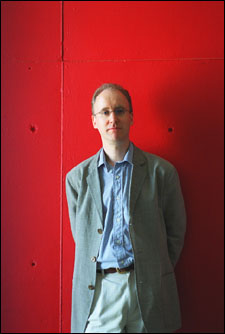Historian Armitage follows ideas where they take him
The larger the focus, the better
For most academics, scholarship means drilling deep into an area of inquiry that is often tightly focused and highly specific.
Professor of History David Armitage takes the opposite approach. “The larger the  focus, the more interesting to me,” says Armitage, who joined Harvard’s Department of History this year from Columbia University. “Ideas don’t sit in one place physically, and they tend to have antecedents and consequences that overflow particular moments.”
focus, the more interesting to me,” says Armitage, who joined Harvard’s Department of History this year from Columbia University. “Ideas don’t sit in one place physically, and they tend to have antecedents and consequences that overflow particular moments.”
An intellectual historian, Armitage describes his sphere of interest as radiating outwards from British history: from England to the rest of Britain and Ireland, then Europe, then the Atlantic world and the broader British empire, and now nearly the entire globe.
“I’m someone who likes to kick away the ladder. I work on something that’s quite narrowly focused, and then I forget about it and move onto the next thing,” he says. “It means I don’t get bored, and my students won’t get bored.”
Speaking briskly in the accent of his native England, Armitage eloquently describes his work and his current projects – all three of them. Boredom, it seems, is hardly an imminent threat.
‘Empire-state building’
Armitage, a graduate of Cambridge University, gained wide recognition in his field for his 2000 opus “The Ideological Origins of the British Empire,” which won the History Today book prize. The book aims to put British history into its widest intellectual context, taking into its sweep ideological notions from ancient Rome as well as neighboring empire-builders such as Spain.
At its heart, the work ponders why Britain’s empire building lagged behind that of other European nations. Armitage’s approach pointed to ideas, rather than military might or wealth, as delaying Britain’s foray into conquest.
“One reason that struck me … was the importance of classical models of history, which show that for example the Roman Empire led to corruption and decline,” he says. When Britons overcame those fears of empire and expansion, they became an imperial power.
One of the book’s most groundbreaking concepts, Armitage says, was how it combined imperial history with domestic British history, helping to launch an intellectual movement that is now very important. “Why did there seem to be two different histories?” he says, noting that historians had previously dealt with either state and nation or expansion and empire. “I believed that it was essential to break down that entirely artificial barrier between those two histories.”
Despite his claims of starting fresh with each new project, Armitage has carried this exploration of the tension between state and empire through his subsequent works. He laughs that he proposed calling it “empire-state building,” but “that hasn’t really caught on.”
Armitage is currently at work on an edition of the colonial writings of John

Locke and on a book called “The Foundations of Modern International Thought,” which looks at the emergence of the idea that we live in a world of states.
His primary current project, however, aims to reinterpret America’s Declaration of Independence in a global context.
“I want to show that it was not unique, there were other examples,” he says. “It was very widely imitated and … it wasn’t unparalleled.”
With these documents of transition as his focus, Armitage once again explores the worldwide political shift from empires to states. And, as with his other work, his scope is wide, spanning more than 200 years and nearly the entire globe.
“The saving grace of the book is that they’re very short documents,” he says of the many declarations of independence he examines.
An intellectual homecoming
Although Armitage’s appointment to the history faculty is new, his affiliation with Harvard is not. He credits a 2000-2001 fellowship at the Charles Warren Center for Studies in American History with laying the groundwork for all his current projects. He’s no stranger to Cambridge or Boston, either, having lived here for several years with his wife, Professor of History Joyce Chaplin.
His Harvard appointment represents an intellectual homecoming, as well.
“Harvard probably now has the largest group of intellectual historians of any department in the country,” he says. “It has a very strong and ongoing commitment to the internationalization and the globalization of not just American history but other histories and I think is a leader in that field.”
James Kloppenberg, Harvard College Professor and David Woods Kemper ’41 Professor of American History, says that the respect is mutual. “David brings admirable breadth and enormous energy to the faculty, which should be particularly valuable at this moment when we are reconsidering our own core curriculum,” says Kloppenberg. “All of us in the History Department admire his rigorous and brilliant scholarship, which is sure to enrich programs ranging from social studies and government through history and literature. We are thrilled to have him with us.”
Indeed, Armitage looks forward to venturing out of the Department of History to work with colleagues in government, international relations, and law. “The kind of approach I take … is one that has always been boundary-busting and long-range,” says Armitage. “I think intellectual historians, more than most historians, follow ideas wherever they go, across national boundaries and periods.”




